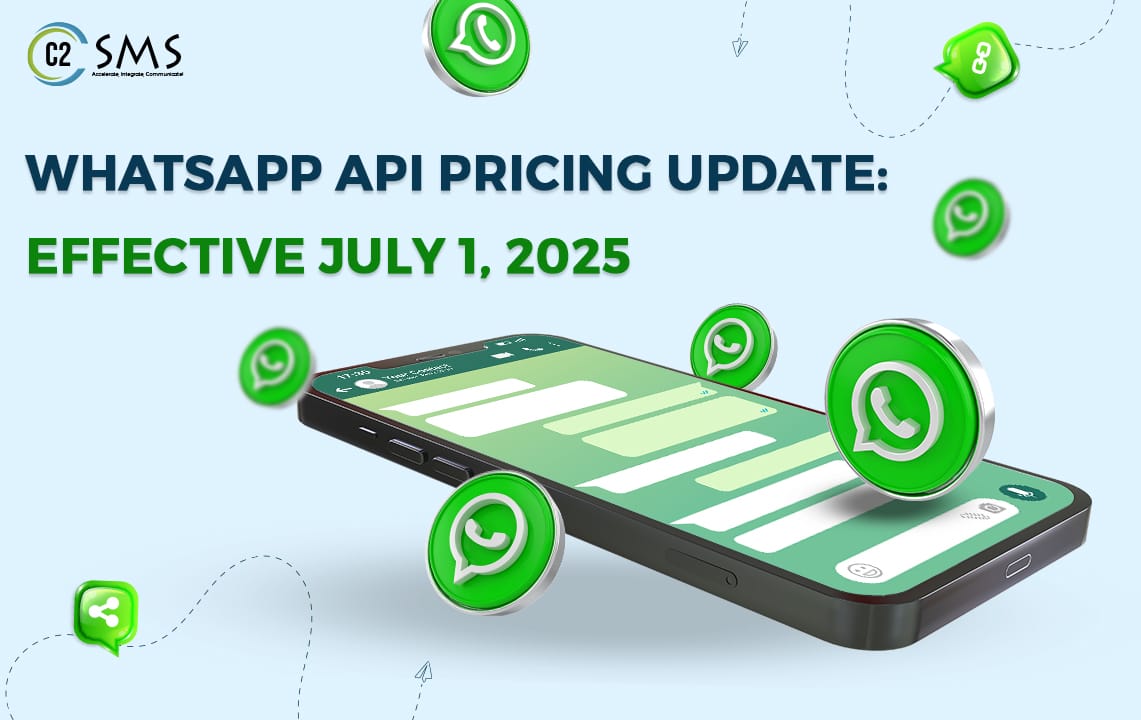
Meta has announced a major update to WhatsApp Business API pricing. The billing will now shift from a per-conversation basis to a per-message basis. This change takes effect on July 1, 2025. It is already live across all major WhatsApp API platforms like EWAT and others. In this blog, we will discuss the updates to the WhatsApp API pricing and how this affects your usage. Let’s dive in!
Key Changes to WhatsApp API Pricing (Effective July 1, 2025)
In the new WhatsApp API pricing, Meta has moved to a per template message pricing model instead of the conversation-based model. This means:
– You will be billed per template message delivered, not per 24-hour conversation.
– This applies to marketing, utility, and authentication template messages.
– Service messages and utility messages sent within an active customer service window remain free.
For instance, if you send one marketing message and one utility message to a customer on WhatsApp, you will be charged for each message separately, as shown in the image below:
What exactly is a Customer Service Window?
When a user sends you a message, a 24-hour support window begins. Each new message from the user resets this window. During this window, you can respond without extra charges and send any free-form messages. Utility templates delivered within this window won’t incur charges. Note: Utility messages sent outside the customer service window will incur standard utility message charges. Here’s an image showing how free-form messages are entirely free when you respond to a user-initiated message.
Breakdown of WhatsApp Template Message Types & Pricing
Template messages are pre-approved, structured messages used to reach users proactively. These messages fall into four categories:
– Marketing
– Utility
– Authentication
– Service (User-initiated)
1.Marketing WhatsApp Template Message
Marketing WhatsApp templates focus on grabbing attention and promoting offers, information updates, abandoned cart reminders, discount coupons, or invitations for customers to respond. Any message not classified as utility or authentication is considered a marketing template. Businesses sending marketing messages will be charged ₹0.88 per message delivered (INR). For messaging users outside India, check country-wise WhatsApp conversation pricing. Example: “Hey there! We’re excited to offer you a 30% discount on our new collection. Hurry, this offer ends soon! Reply with ‘YES’ to claim your discount.”
2. Authentication WhatsApp Template Message
Authentication WhatsApp templates are essential for ensuring user account security. This category allows businesses to authenticate users with one-time passcodes during the login process (e.g., account verification, recovery, integrity challenges). Each authentication message costs ₹0.125 per message delivered (INR). For messaging users outside India, check country-wise WhatsApp conversation pricing. Example: “1024 is your authentication pin. Please use this to log into your EWAT account.”
3. Utility WhatsApp Template Message
Utility WhatsApp templates help with specific requests or transactions initiated by users or provide updates for ongoing transactions. This category includes post-purchase notifications, order confirmations, delivery updates, and billing statements. Each utility template costs ₹0.125 per message delivered. For messaging users outside India, check country-wise WhatsApp conversation pricing. Example: “Great news! Your recent order has shipped and is on its way to you. You can track your package using the provided tracking number. We appreciate your business!”
4. Service WhatsApp Template Message
Service WhatsApp templates focus on user-initiated inquiries, aiming to offer great customer support and assistance. Whether users have questions or concerns, businesses are there to help. All user-initiated conversations fall under the service category. Effective November 1, 2024, user-initiated or service messages are free for all businesses. Example: “Hello! How can we assist you today? Our support team is here to help with any issues or questions you might have.”
Understanding the WhatsApp API Pricing Change with an Example
- Day 1 – 10:00 AM:
A customer messages your business: “Hi, I need help with my order.”
A 24-hour customer service window starts.
You can reply for free (with text or any rich content).
You can also send a utility template like “Your order #1234 is out for delivery” without any charge. - Day 1 – 6:00 PM:
You send an update: “Your package has been delivered.”
This is within the 24-hour window, so still free. - Day 2 – 11:00 AM:
You try to send a follow-up message: “Was everything okay with your order?”
The 24-hour window has expired (the user hasn’t messaged again).
You must now use a charged template message (like a utility or marketing message) to reach out.
Why Has Meta Changed the WhatsApp API Pricing Model Again?
Are you wondering why Meta has changed from a conversation-based to a template-based pricing model? According to Meta, this change aims to simplify pricing and make WhatsApp more like other messaging platforms. Businesses found the previous conversation pricing model confusing since they were charged per conversation in a 24-hour period. The per template message charges simplify the pricing for users, making it easier to start with WhatsApp Marketing.
For more updates Stay connected with C2sms Blogs!!


